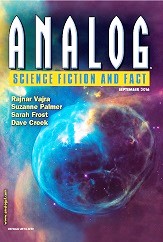 Analog, September 2016
Analog, September 2016
“Progress Report” by Rajnar Vajra
Reviewed by Chuck Rothman
The September issue of Analog starts out with the excellent “Progress Report” by Rajnar Vajra. It begins leaving the reader in the dark with the thoughts of a catlike creature who begins to discover his environment. As the days go on, though, the creature slowly gains intelligence, as well as the ability to understand words, and eventually to speak. It’s a slow journey as Arlie learns the skills needed to survive in the world and society – with some interesting twists. The story slowly reveals the background and, while I don’t usually like stories that are merely revelations, Vajra has created a fascinating society, as well as playing with some imaginative concepts. Definitely a top notch story.
From the title alone, you can see that Susan Palmer‘s “Detroit Hammersmith, Zero-Gravity Toilet Repairman [Retired]” is going to be a lighthearted tale. Hammersmith – Deet to his friends – has been called back to deal with the problem of toilets failing on a space station dedicated to negotiations between worlds. He discovers the cause is a strange frog-like creature whose secretions eat through the mechanisms. But where did they come from, and what are they? The story’s light tone does not restrict it from being a solid scientific mystery about alien life, and the silliness sprinkled in makes it fun to read.
Sarah Frost‘s “Deep Waters Call Out To What Is Deeper Still,” is set in a future aquarium where the scientists can link with an animal’s mind to see its thoughts. Pascal is discovering the secrets of a swordfish when something new is added: a giant squid becomes part of the collection. The problem is trying to figure how to calm the animal, which is terrified by the change in its environment. Frost plays with pronouns, using “Zie” and “zir” as subject and possessive and while I understand what zie is trying to achieve, it was just a little bit distracting. Still, once you get over that, it’s a decent scientific mystery.
“Silhouettes” by Dave Creek takes the form of various reports from Leo Bakri, an old man who has been stationed on the planet Keleni, in order to study the life of one of their wildlife, the manta glider. The planet has a difficult ecology – high winds blowing all the time, but as Leo observes, he discovers that their life span has relevance to his own experiences. This is a nicely observed alien ecology, though I didn’t find the story compelling enough.
“Adventures in Family Bonding” is the type of social extrapolation that was a mainstay of science fiction years ago. Erin Troyer gets a request from her son to care for his child Gene. Gene isn’t an ordinary child; he’s a robot, bought to replace a child who died. There’s a lot of uncanny valley reaction by Erin, who lives off the land and distrusts technology so much that she doesn’t have a network connection. But there’s a catch to all this that makes it even worse. W. Michael Beachy draws a consumer society gone mad to its final stage.
C. Stuart Hardwick contributes “Dreams of the Rocket Men,” a look back by the narrator, Jimmy, about his boyhood relationship with his neighbor Mr. Coanda, who built rockets in his barn – tests and models that the boy found utterly appealing. And, as he grows up, he finds the things he learns from Mr. Coanda show him his life’s path. It’s a charming look at boyhood and where our dreams come from, as well as how dreams are passed on to others.
“Nesting Dolls” by Jacob A. Boyd takes a different tack on the concept of the generation ship. Garen and his brother Blyte are members of the crew of a ship heading toward the stars, lording it over the people “inside” – in the lower strata of the ship. When Blyte is captured by the people inside, he goes after his brother, which ends up revealing the nature of the situation. While the particular twist is certainly different, I didn’t find the story particularly compelling.
The stories all concentrate on the settings and ideas, but some just don’t do enough as a story other than portraying a well-thought-out situation. But overall, there’s plenty of good reading.
Chuck Rothman’s novels Staroamer’s Fate and Syron’s Fate are available from Fantastic Books. He has work in the anthologies Temporally Out of Order and at Digital Fiction Publications.